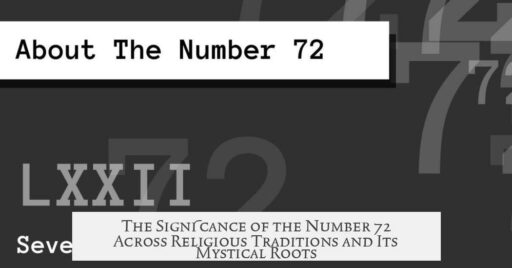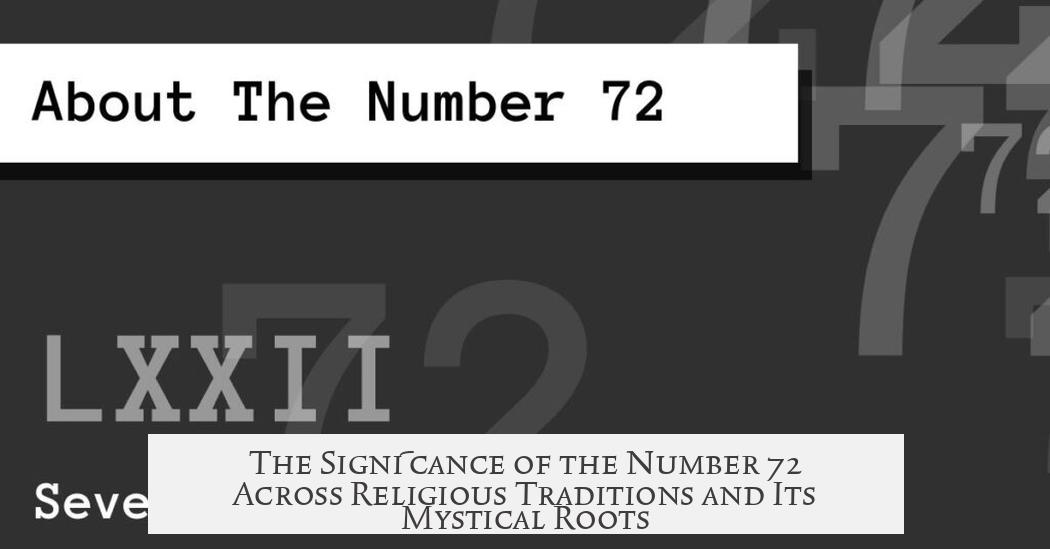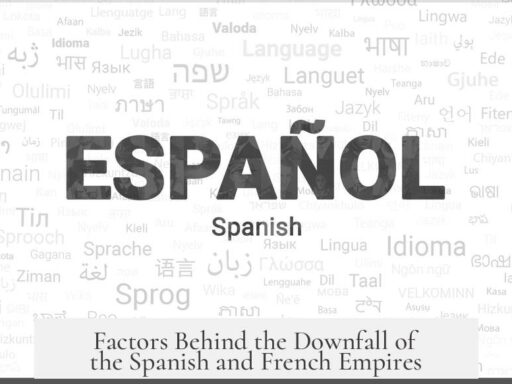The number 72 carries deep symbolic importance across many religious traditions due to its mathematical properties, cultural meanings, and historical usages. It appears repeatedly in Abrahamic traditions like Judaism and Christianity, owing to mystical interpretations and scriptural instances. In parallel, Chinese numerology also features 72 prominently through structural symbolism in the I Ching. The recurrence of 72 likely results from a combination of meaningful numerology and independent developments in unrelated cultures.
In the Abrahamic tradition, particularly Jewish mysticism, gematria plays a key role in the meaning of 72. Gematria assigns numerical values to Hebrew letters and words. Mystics interpret verses as complex equations where numbers link concepts spiritually. The number 72 factors as 23 × 32, or 8 × 9. Both 2 and 3 are culturally symbolic: 2 stands for union or duality, while 3 represents completeness.
8, the small gematria value of words like Torah and names of God, connects 72 to divine teachings and goodness. The number 9 also has special meaning; it is “thrice complete” and relates to Adam’s name. Multiplying any number by 9 and summing digits returns 9, reinforcing its significance. Hence, 72 = 8 × 9 symbolizes a mystical union of God (8) and humanity (9), reinforcing connectedness and spiritual completion.
This layered gematria interpretation imbues 72 with multiple spiritual layers focused on divine completeness, creation, and goodness.
| Prime Factors of 72 | Symbolic Meaning |
|---|---|
| 23 = 8 | Divine teachings (Torah), God’s name |
| 32 = 9 | Completeness, Adam (man), spiritual perfection |
Historically, the number 72 surfaces repeatedly in Judaic and Christian texts. Genesis 10 lists Noah’s descendants totaling close to 72 after symbolic rounding. The Septuagint translation was attributed to 72 elders or translators. Jesus is said to have sent 72 disciples in Luke 10. The number symbolizes completeness and order, often connected with 6 and 12—6 being the first perfect number and 12 symbolizing divine governance (e.g., 12 tribes, apostles). Multiplying 6 by 12 gives 72, blending Jewish and Hellenistic numerology.
Later Christian writers expanded the use of 72 into canonical and mystical contexts. Examples include the 72 hours Jesus spent in the tomb, the 72 books of some biblical canons, and rules around church governance involving 72 bishops. This sustained use reflects layering of traditions interpreting earlier numeric symbolism and integrating them into evolving beliefs.
In Chinese tradition, the number 72 emerges independently but also holds cultural weight. The I Ching features 8 primary trigrams derived from yin-yang duality and 64 combined hexagrams formed by these trigrams. Adding 8 and 64 yields 72, giving the number structural significance in East Asian cosmology. The number 8 alone is highly auspicious in Chinese culture, implying luck and order. Thus, 72 here reflects completeness and cosmic structure through a different numerological route.
- 72 links to yin-yang, trigrams, and hexagrams in Chinese thought.
- Emphasizes balance and harmony ideals.
- Reflects cultural valuation of certain key numbers such as 8 and 64.
Cross-culturally, 72’s recurrence may seem coincidental but also reveals how ancient civilizations valued number symbolism. Its factors 2, 3, 8, and 9 appear in many cultures’ spiritual vocabularies with linked meanings about unity, completeness, and cosmic order. The recurrence likely arises from:
- Intrinsic mathematical properties making 72 a neat, divisible, and symbolically rich number.
- Independent cultural practices developing numeric symbolism based on practical and mystical observations.
- Historical transmissions mainly within Abrahamic religions, augmenting its spiritual weight.
In sum, the number 72 appears widely across religions because its numerological qualities embed spiritual ideas of completeness, divine-human connection, and cosmic order. Its repeated use across texts, mystical systems, and cultural symbols further entrenches its significance. While some uses arise uniquely (such as in the I Ching), others stem from shared religious and historical traditions.
Key takeaways:
- 72’s prime factors 23 and 32 link it to symbolic concepts of union, completeness, and divine goodness in Hebrew gematria.
- Judaic and Christian traditions use 72 in genealogies, translations, disciples, and mystical interpretations, often related to numbers 6 and 12.
- In Chinese numerology, 72 emerges structurally from the 8 trigrams and 64 hexagrams of the I Ching.
- The number’s recurrence across cultures reflects human tendencies to find meaning in numbers with special mathematical and symbolic properties.
- This cross-cultural symbolism often develops independently but retains common themes of order, harmony, and spiritual significance.
Why Does the Number 72 Appear in So Many Religious Traditions?
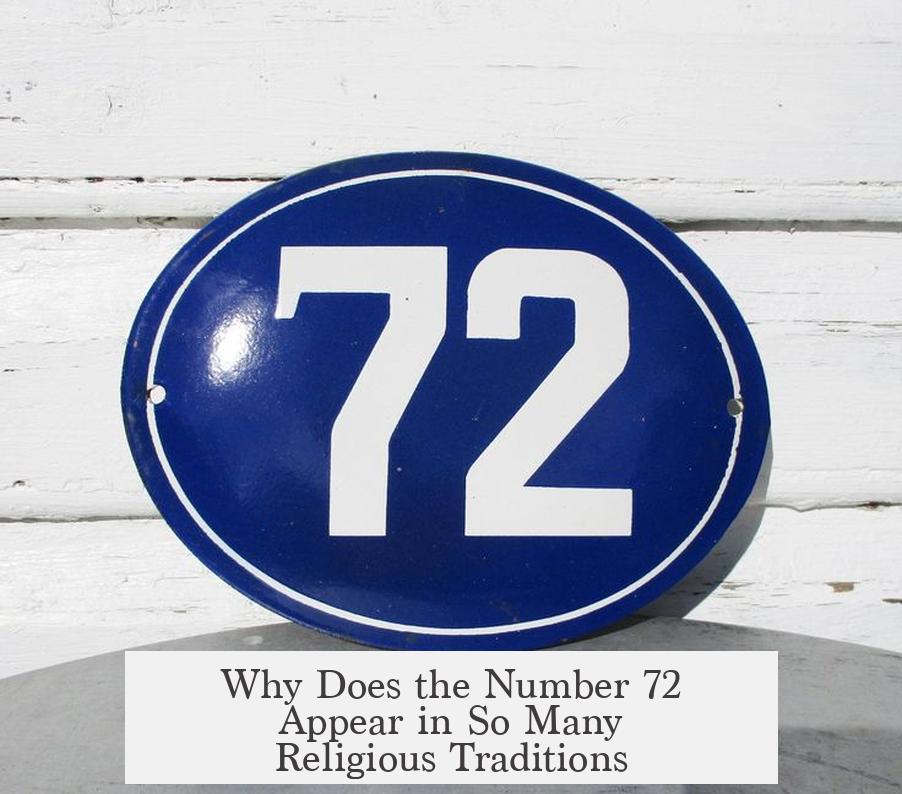
The number 72 shines brightly across many religious traditions because of its deep symbolic roots and fascinating mathematical properties that connect divine concepts, cultural beliefs, and mystical insights. This blog peels back the layers on why 72 isn’t just a random figure but a sacred bridge linking humanity’s quest to understand the universe.
So, why 72? Let’s dive into the mystical, historical, and cultural waters where this number swims.
Diving Into the Abrahamic Tradition and the Power of Gematria
First, imagine a language where letters double as numbers. That’s Hebrew for you. This dual identity is called gematria, a system where every word has a secret numerical code.
Hebrew mystics use gematria like a giant cosmic cipher. Words with the same numerical value are thought connected on a mystical level. It’s like finding secret friends in a coded language.
Now, the number 72 specifically breaks down into prime factors as 23 × 32, or 8 × 9. Each of these components holds its own sacred meaning:
- 2 stands for union or duality; think male and female, light and dark.
- 3 symbolizes completeness or wholeness.
- 8 (which is 23) is the gematria for words like Torah, “good” (tov), and names of God including the sacred tetragrammaton (Yahweh).
- 9 (which is 32) is “thrice complete” — that’s completeness squared, on steroids. 9 also matches the gematria of Adam’s name, tying it directly to humanity’s origin.
Put together, 72 symbolically equals God multiplied by Man. This cosmic equation elegantly captures creation and divine completeness in one number.
Ancient Hebrew Wisdom and Numerical Magic
The ancient Hebrews spotted a mesmerizing gematria trick: multiply any number by nine, sum the digits, and the answer circles back to nine. This numeric loop mirrors the eternal or unbroken circle of creation and goodness.
So, the number 72 isn’t just arithmetic — it’s a poetic statement about the universe’s divine design and humanity’s special place within it.
72’s Journey Through Judaic and Christian Traditions
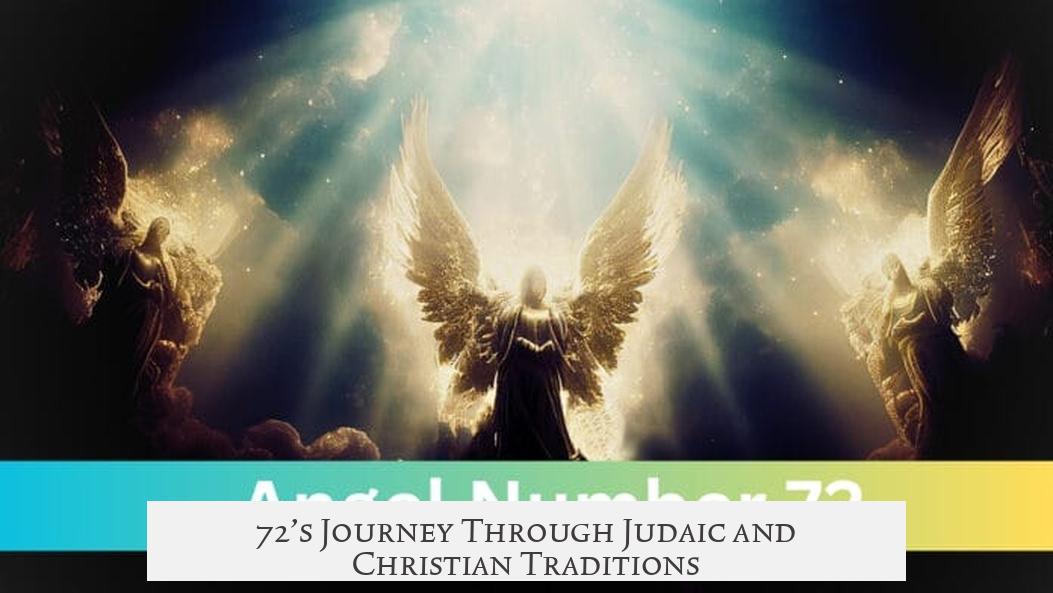
Moving beyond numbers, the number 72 appears repeatedly in stories and scriptures. Remember Noah’s descendants? Genesis 10 lists them, and depending on the version, there’s content debate: 71 descendants in Hebrew texts, 73 in Greek translations. For symbolic clarity, 71 was rounded to 70, a number with spiritual heft.
This rounding explains why you see 70 elders at Sinai, 70 translators of the Septuagint, and 70 disciples. Yet, in many traditions, 72 also pops up as a symbolic alternative.
The Sacred Multiplication of 6 and 12
Jewish and Christian thinkers borrowed a bit from ancient Greek numerology too. The number 6 was known as the ‘first perfect number,’ representing harmony. Jewish symbolism revered 12 (think twelve tribes of Israel and months of the year). Multiply 6 by 12, and voilà—72. This mathematical connection gave 72 both cultural and mystical resale value.
The Letter of Aristeas, a famous text detailing the making of the Septuagint (the Greek translation of Hebrew scriptures), cites 72 translators. This choice was no accident; it’s a nod to all the divine symbolism packed into this perfect number.
Expanding the Legacy in Christian Writings
Christian authors in late antiquity embraced 72 for various symbolic uses:
- Christ spent 72 hours in the tomb according to Bede.
- 72 bishops were needed to condemn a fellow bishop, a rule from medieval canon law.
- Isidore listed 72 books of the Bible.
Each of these references reinforces a chain of tradition, linking back to earlier symbolic meanings. The number grows roots, branches, and leaves in theology and church governance.
What About 72 in Chinese Numerology?
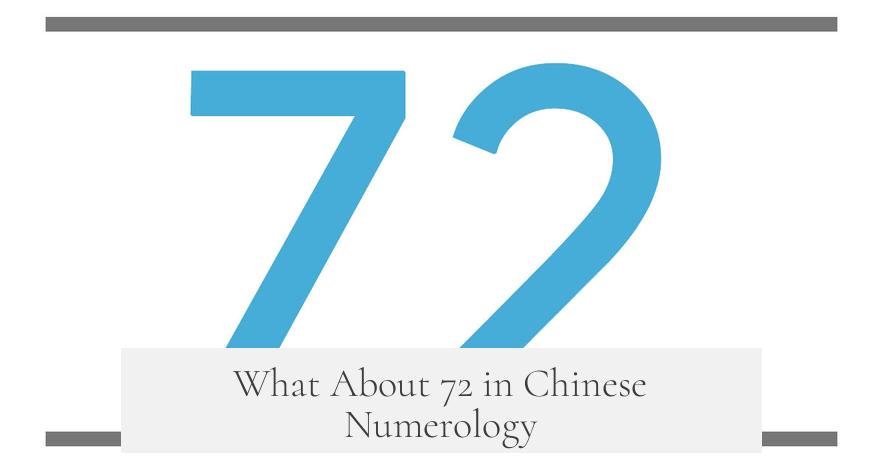
The story takes an interesting turn when we look eastward. In Chinese culture, 72 emerges naturally in the structure of the I Ching.
Here’s how: the I Ching is built on 8 trigrams, fundamental elements made of three lines each, representing yin or yang (the cosmic duality). These trigrams combine to form 64 hexagrams — unique states or situations.
The math? 64 hexagrams + 8 individual trigrams = 72. No mystical rounding, just logical addition.
Interestingly, 8 is a lucky number across East Asia. Many gifts come in eights; the South Korean flag proudly features the bagua, a symbol made of trigrams; and martial arts movements follow the patterns of these trigrams.
In this case, 72 encapsulates the interplay of cosmic forces, yin-yang balance, and earthly phenomena. Different origin, same sense of sacred structure.
Is It All Just Coincidence?
It’s tempting to think that ancient cultures just randomly fancied the number 72. But many ancient peoples took numerology seriously. Whether 72’s occurrence across Hebrew, Christian, and Chinese traditions is coincidence or convergent symbolism, the fact remains: there’s something about 72 that captures the human imagination.
Numbers like 2 and 3 hold universal meaning—duality, completeness. Prime factorization makes 72 a neat package of these concepts. So independent cultures might independently settle on this number as symbolically meaningful. Call it cosmic math, or human pattern-seeking.
Quick Recap in a Nutshell
| Tradition | Why 72? | Related Symbolism |
|---|---|---|
| Hebrew (Gematria) | 72 = 23 × 32; connects duality (2), completeness (3), divine goodness (8), humanity (9) | Number mysticism; God × Man connection |
| Judaic & Christian | Linked to symbolic rounding of Noah’s descendants; 6×12=72 in numerology | 72 translators, elders, disciples; expansions in Christian lore |
| Chinese | Sum of 64 hexagrams and 8 trigrams from I Ching | Yin-yang balance, cultural luck of 8, cosmic structure |
| General | Number’s prime factors and symbolism give it broad spiritual appeal | May be both coincidence and cultural convergence |
Why Does This Matter Today?
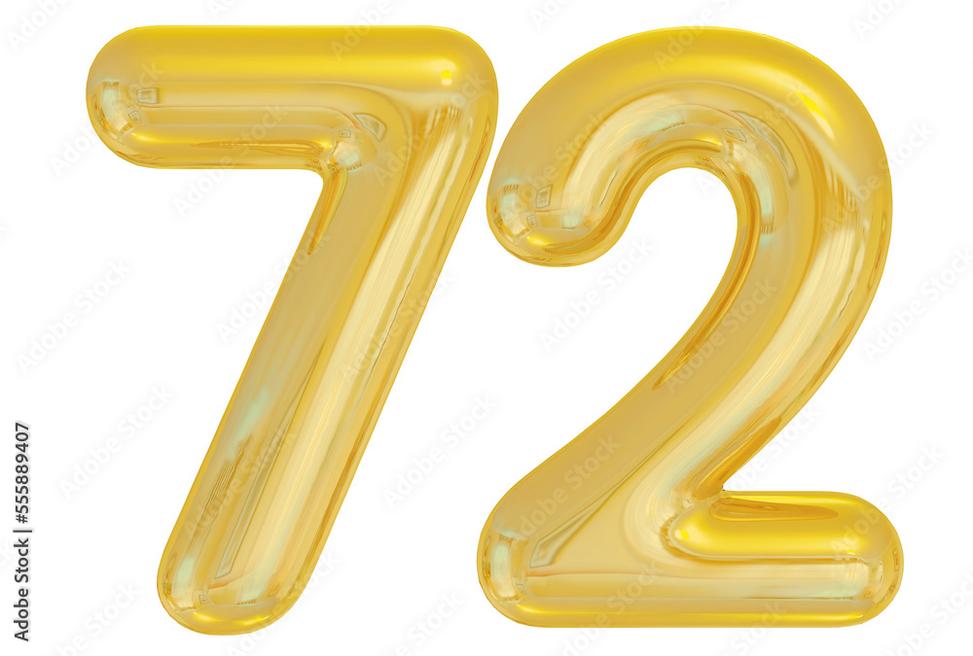
You might ask: “Why should I care that 72 appears all over religious texts and ancient philosophy?”
Because it highlights a timeless human habit—to find patterns, meaning, and connection where others see just numbers. It reminds us that somewhere around us, numbers tell stories, encode values, and link souls across space and time.
Next time you see 72 cropping up—whether in scripture, history, or even street addresses—remember that this humble number carries a suitcase of heritage, symbolism, and a pinch of cosmic magic.
Final Thoughts: Embracing the Mystery
The story of 72 is part math puzzle, part history lesson, and all heart. It’s a number that invites you to explore the intersection of culture, faith, and science with a little chuckle at how humans try to make sense of the universe.
So, the next time someone asks, “Why 72?” you can reply with confidence: it’s the ancient cosmic handshake between heaven and earth, math and mystery, God and man — all summed up in two digits.
Why is the number 72 important in Hebrew mysticism?
In Hebrew mysticism, 72 links to gematria, where letters have numerical values. Its prime factors (2^3 × 3^2) relate to sacred numbers symbolizing union (2), completeness (3), goodness (8), and humanity (9).
How does the number 72 appear in Judaic and Christian traditions?
72 shows up in various texts: 72 nations, 72 translators of the Septuagint, 72 elders, and 72 disciples. It reflects symbolic importance of numbers 6 and 12 (6 × 12 = 72) and was sometimes rounded for ritual meaning.
What is the significance of 72 in Chinese numerology?
The number 72 arises from adding 64 hexagrams and 8 trigrams in the I Ching. The number 8 symbolizes balance and harmony, leading to 72 being culturally important in East Asian traditions.
Why do different cultures find significance in the same number 72?
72’s factors and ties to important numbers (2, 3, 6, 8, 9, 12) repeat in many cultures. This numeric harmony and structure make it attractive across unrelated religious and philosophical systems.
Did historical rounding affect the symbolic use of 72 in religious texts?
Yes, some biblical counts list 71 or 73 descendants but were rounded to 72 for symbolic reasons linked to 7 and 10, showing how symbolic numerology influenced textual traditions.
